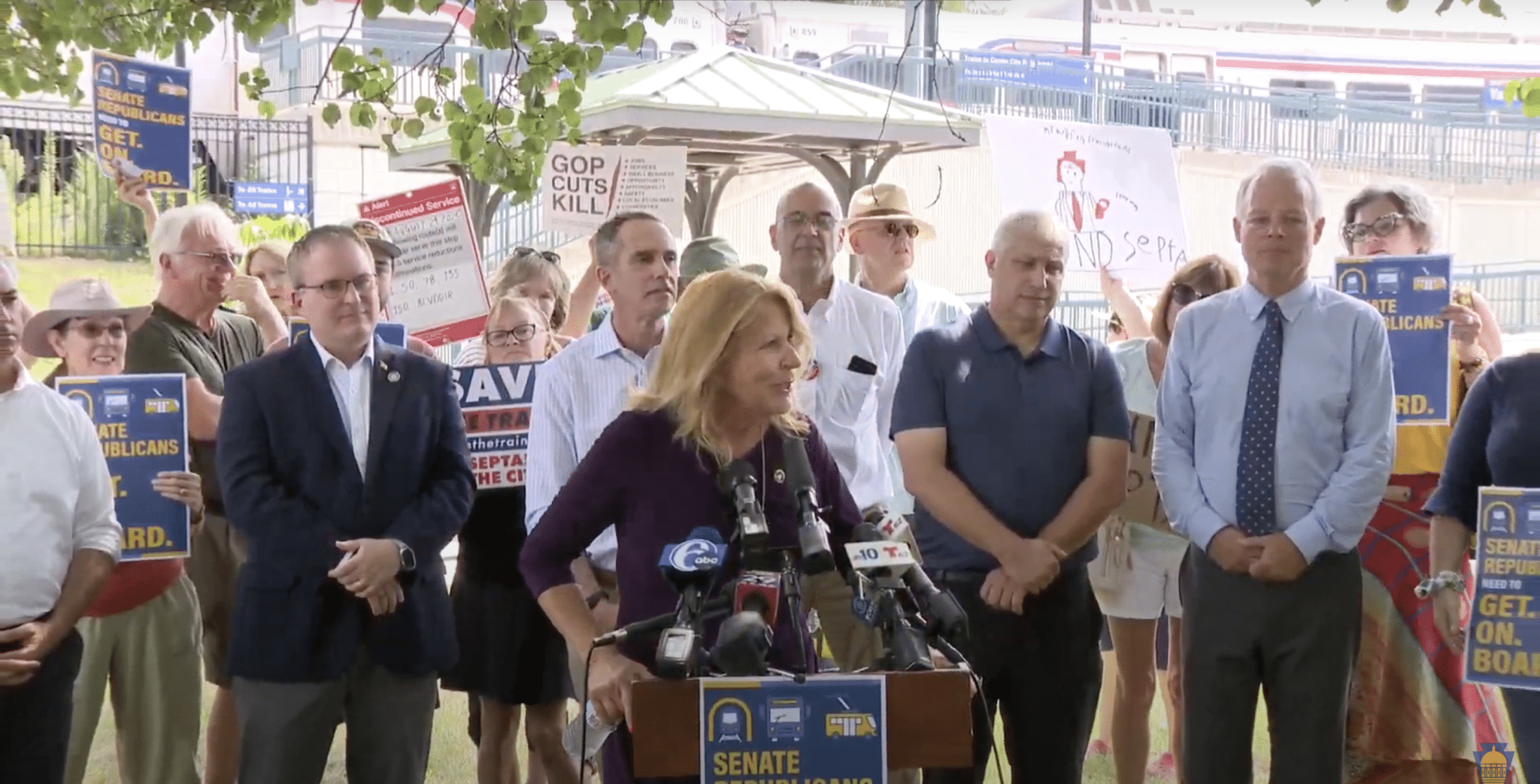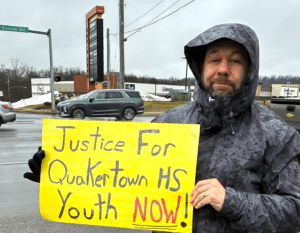Local Democratic lawmakers called the Republican State Senate transit bill, which failed to pass a Thursday night vote, a “Band-Aid” for SEPTA funding that didn’t offer a sustainable long-term solution during a press conference hosted by State Sen. Steve Santarsiero at the Yardley Train Station on Thursday.
Alongside Santarsiero, State Reps. Perry Warren, Tina Davis, Brian Munroe, Jim Prokopiak and Bucks County Commissioner Bob Harvie spoke about the impact SEPTA’s service cuts will have on their constituents.
NBC Philadelphia.com reported that since lawmakers failed to reach a deal on Thursday, SEPTA will begin a “10-day preparation period for 20% cuts across the board to service.” Details of the service cuts may be found here.
SEPTA is facing a $213 million budget gap. It will significantly reduce trips on all rail services including a 9 p.m. curfew on Jan. 1, 2026. A 21.5% fare increase and a complete hiring freeze will be implemented Sept. 1.
The Democratic lawmakers emphasized the major role SEPTA plays in Southeastern Pennsylvania’s economy. In about a week, students will use SEPTA to commute to their college classes adding to the number of everyday commuters.
The Pennsylvania State Senate passed a Republican-supported transit bill on Tuesday, that would have set up a state transit fund for two years. That version of the bill would have funded SEPTA through the Public Transportation Trust Fund, interactive gaming revenue and mandated fare increases.
State Rep. Warren urged senators to pass Democrats’ House Bill 1788 as a sustainable revenue source for SEPTA and transit operations across the state. Democrats passed HB 1788 on Monday which increased allocations from state sales tax to help SEPTA’s budget gap.
“The bill was a compromise bill. It included proposals that had been made by Republican members of the general assembly — the senate and the house — to try to forge a bill that would satisfy everyone and the bill passed,” Warren said.
Santarsiero said during the press conference there had been ongoing discussions. He predicted at the time a deal would not be brought together by SEPTA’s deadline Thursday night.
SEPTA will move forward with implementing Phase I service cuts on August 24 and increase fares on September 1.
READ: Proposed SEPTA Cuts Are Devastating for Bucks County Workers and College Students
“On the one hand, I’m glad that the Senate Republicans have finally acknowledged that this is an issue and that they thought that they had to in fact move a bill, but unfortunately the bill that they moved is not a solution,” said Santarsiero.
The service cuts will end 32 bus routes including five Regional Rail lines. The Cynwyd Line, Chestnut Hill West Line, Paoli/Thorndale Line, Trenton Line, and Wilmington/Newark Line, transporting residents of Bucks County and surrounding counties in and out of the city, will be cut Jan. 1, 2026.
WHYY.org reported some service lines with higher ridership are slated for cuts, while routes with “lower ridership” remain.
Bob Previdi, a transit advocate, said he represents 8,000 people in northwest Philadelphia worried about losing the Chestnut Hill Westline.
“The Chestnut Hill West Line is the heart of what made those communities in Germantown, Mount Airy and Chestnut Hill grow and thrive. People move there because they have that option to get into the city,” Previdi said.
Commissioner Harvie, a member of the SEPTA Board, said members of the state senate need to “show up and do their jobs.”
“The cuts that are going into effect are not what SEPTA wants to do. We want to launch the bus revolution, we want to modernize our travels, we want to do the work on our stations to make sure they are accessible to everybody, we want to launch the signage improvements that we have planned,” Harvie said.
READ: Harrisburg Must Lower Energy Costs, Invest in Transit and Parks in the Upcoming State Budget
Bill Ashmanskas, a resident of Yardley and SEPTA rider, said he and his wife moved to Yardley because the SEPTA Regional Rail allows them to commute to their jobs. Ashmanskas highlighted the impact SEPTA has on the wider community.
“The existence of SEPTA Regional Rail keeps my car and many of my neighbors’ cars off of I-95, which reduces highway congestion for the many other people whose work locations or schedules are not compatible with the train commute,” Ashmanskas said.
Other residents, like Jeanne Bray and D. Goet came to support the press conference and to learn more from their legislators. Bray said she uses SEPTA to visit her children and grandchildren in the city and sees the importance of the transit system to the region.
“Sometimes it’s hard to understand the specifics, you know,” Goet said. “That was part of it to come and get real information, certainly, in support of SEPTA, knowing they use it and how important this is to us and this community.”







